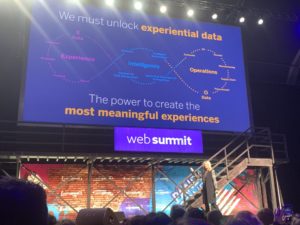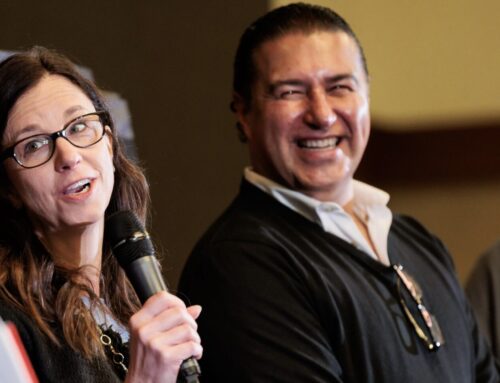This week our Director of Innovation, Kat Murray-Clark, visited the Web Summit 2019 in Lisbon. This is the second of her two-part update on the event (click here for part one). She looks at how the theme of companies being ‘purpose-driven’ was treated by different speakers and gives her concluding remarks.
On the second day of Web Summit 2019, speakers took to stages across the Altice Arena in Lisbon to discuss the promise and perils of the digital age. This year’s event focused on divisive politics, government policy, and data privacy. It also included so many mentions of ‘purpose’ that I almost forget what the word meant.
“What the world wants of us is to move technology forward in a way that preserves values that are timeless – values like fundamental human rights, respect, and opportunity for people.” – Brad Smith, Microsoft
My personal highlights: different perspectives on being ‘purpose-driven’
My personal highlights came from three speakers with three different perspectives. They all discussed the key to engaging customers and motivating employees.
- Alicia Tillman, the CMO of SAP, claims that we currently exist in an “experience economy” where emotions are used to create unique and meaningful interactions with consumers.
- Frank Cooper, the CMO of Blackrock, insists that even if organisations weren’t founded with a particular purpose in mind, it’s never too late to discover one. He thinks companies should find out what drives their employees and make a connection between their passion and what energises them.
- Rankin says it’s not about consumers or customers, but about people. He called for brands to be more authentic and honest, to have opinions and personalities and demand better than “good enough”.

Rankin on stage at Web Summit 2019 in Lisbon
Sell me the truth
Rankin
Rankin is a world-famous photographer who has recently become a brand in his own right. He has launched his own full-service creative agency, RANKIN. The agency harnesses Rankin’s reputation as a cultural provocateur and combines it with end-to-end production. It aims to disrupt the siloed agency model and cut through media clutter with Rankin’s own famous brand of “radical honesty”.
In Rankin’s view, creatives should never do as they’re told because they are being paid to be annoying, have an opinion, and be contrarian. Most importantly, they’re there to push back when things aren’t good enough.
It’s in this context that Rankin discusses brands and their need to differentiate themselves. There’s a lot of talk about “purpose-driven brands”. Rankin’s opinion is that in addition to this, brands have become people, and people have opinions and personalities. Therefore, brands need to have opinions too, and these need to be consistent.
According to Rankin, the only way to separate the signal from the noise and engage audiences is through provocation.

Frank Cooper, CMO of Blackrock, on stage at Web Summit 2019 in Lisbon
The end game: making purpose real
Frank Cooper, CMO, Blackrock
The notion of being a purpose-driven company is ubiquitous. It’s clear to us all that the benefits of being a purpose-led and mission-driven organisation are huge, from increased customer engagement and employee morale to a rise in innovation and profits. However, although many companies say that they have a purpose beyond making profits, this is rarely the reality.
What is purpose? And what does it mean to be purpose-driven? According to Frank Cooper, your purpose is not the same as your principles. It’s not your mission statement, philanthropy or CSR. Your purpose is in fact “your fundamental reason for existing in the world.”
What if you weren’t set up with purpose driven in mind?
But what if your company exists in the world simply to provide a service in exchange for monetary gain? Or you didn’t ‘start with why’, as Simon Sinek says? What if you started with “what”? Or your founder simply had a great idea and created a great product or service to bring that idea to life? What if your original purpose was just to survive until you thrived?
It’s ok to admit it, Cooper says. In fact, it doesn’t matter if you never started with ‘why’. What really matters is that you uncover what your purpose is now, and then bring it to life within your company.
Cooper’s main advice is: don’t pay a consultancy to create a purpose for you. Instead, you should start by asking questions within the organisation. Speak to your employees and take on board what they have to say. It’s not easy as it requires a certain level of vulnerability for your employees to open up about what their strengths and passions are. Furthermore, a sustained effort is required to figure out what energizes them, and they need the space and freedom to talk openly about it.
It’s hard enough discovering what your purpose is as an individual. So how does a company made up of individuals with different opinions and personalities discover their collective purpose?
Blackrock have created their own tools, platform and process to aide individuals to match their passions and strengths to a shared sense of purpose. Unfortunately, in his short 20-minute talk it wasn’t completely clear to me how it all comes together. However, I do agree that it’s better than retrospectively fabricating an artificial founder-driven purpose.

Alicia Tillman, CMO of SAP, on stage at Web Summit 2019
Catching feelings: the power of experience
Alicia Tillman, CMO, SAP
“Differentiation goes well beyond the features and functionality of the products that we offer to the customers that we serve. Today, business is about winning hearts, minds and souls. That’s how we win.” – Alicia Tillman
As humans, we experience 27 different kinds of emotions, from admiration to amusement, boredom to entrancement, envy to excitement. We have always been drawn to brands that evoke warm emotions. But in the last 20 years the way we measure value has significantly shifted. Besides, four of the top five most valuable brands in the world are now technology companies, and they don’t naturally evoke the warm and fuzzies.
In addition, we can see that there are higher expectations on brands today. Our emphasis on an “experience economy” means that consumers are demanding unique and meaningful interaction from brands. Adding to this is the fact that SAP’s research reports that 80% of customers have switched brands because of a single poor customer experience.
So how do companies build meaningful experiences that keep customers for life? Tillman says the key is bringing emotions back into the buying process. Here is her list of 5 key steps to achieving that:
- Listen to your customers and act on their feedback. People are tired of surveys with no action being taken. So if you’re not willing to implement the feedback, then don’t ask.
- Create purpose-driven value (this is a familiar refrain!).
- Use data to personalise customer’s experience. Or in Tillman’s words: “augment experiences with artificial intelligence and machine learning to create the personalization, that your customers expect.”
- Involve diverse perspectives when creating your strategy.
- Show empathy. Empathy is different from sympathy, as you have to genuinely put yourself into the position of those you’re connecting with.
My Conclusion: The importance of an authentic purpose-driven ethos
By the end of Web Summit 2019, I was slightly disillusioned by the polished messages delivered by the CMOs, CTOs and CEOs of incredibly successful companies. I think that Rankin is right: it’s not about consumers or customers, it’s about people. The organisations behind these brands are made up of individuals with their own opinions and personalities. How much time your marketing department spends on communicating your purpose isn’t the most important matter. Because if you don’t care about the people working for you or are selling to, then eventually consumers will see through it.
Although Web Summit is a tech conference, I think what was missing from almost every talk I went to was a genuine interest in the human factor. How can you create a genuine human-connection in your services and systems? What is needed to improve the lives of the people who work for you? How do you create a culture that supports people in every aspect of their lives, not just their work? How do you distinguish between authentic purpose-driven change and having manufactured consent on purpose? These are the topics I’d rather hear discussed. I want to understand how we can put the human experience back into the “experience economy”, and I believe empathy should be more than just point 5 on a list of ways to engage your audience.





